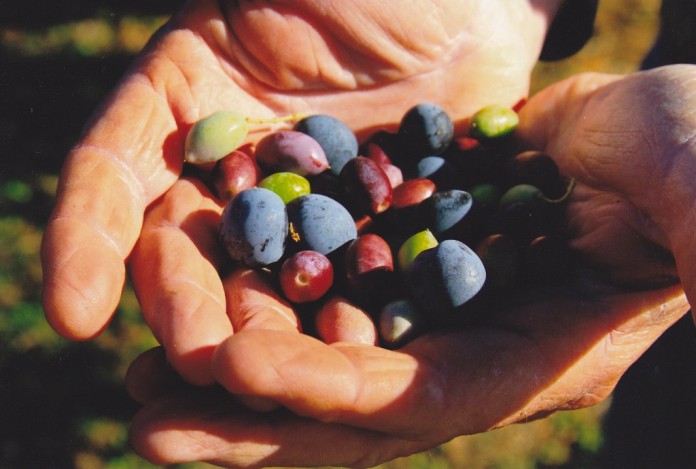By Jennifer Crain
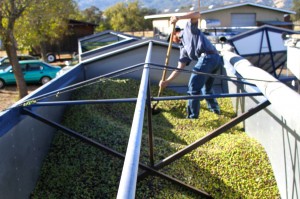
Several years ago, lifelong farmer and California native Chris Steele bought land in the Capay Valley, returning to the place where he grew up.
Steele tells me it’s hard to find land in the area, at least enough to do any farming. Much of it is still held by the descendants of an influx of farmers who settled in the area in the mid-1800s. Before Steele purchased his land, it had been in the same family since 1856.
The valley, bordered by the Blue Ridge and the Capay Hills and sitting northeast of Napa Valley, is perfect for one of California’s signature crops: grapes. But Steele discovered, soon after moving back, that his neighbors were starting to plant olive groves. It turns out that Capay Valley soil is naturally high in boron (like only two percent of soil in the state) and has a high pH, two crucial elements for olives to thrive.
In olives, Steele found his match. When I asked what other crops he grows, he parenthetically referred to other orchard crops such as walnuts, almonds, and fuyu persimmons.
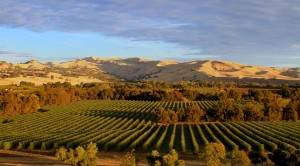
“I’ve always been farming, all my life,” Steele says, “and I couldn’t think of a crop to grow that would be more fun. It’s quite challenging to grow a great olive. It’s pretty easy to get just average oil. It takes a lot of effort to get great oil.”
The polished flavors of the oils produced by Steele’s Capay Valley Ranches are what caught the attention of Dave Jekel, co-owner of Spud’s Produce Market. Jekel says he had never tasted anything like the oils, such as those infused with blood orange, Meyer lemon, and basil. The company also produces a line of balsamic vinegars.
When Jekel met Steele through a mutual friend at a party, he was engrossed in their conversation, engaged with Steele’s description of his operation and with his love for the botany and chemistry involved in growing a perfect olive.
“I could see what kind of passion he has for it,” Jekel says. “I definitely wanted to be in business with him.”
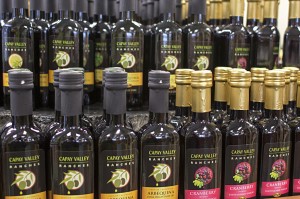
Steele praises the “incredible responsiveness” of an olive tree to farm practices. The same quality that makes olives difficult to grow, their sensitivity, also acts as a nuanced guide for careful growers. Tweak one element – a particular mineral in the soil, an extra gallon of water – and the flavor profile of the resulting fruit changes dramatically. It’s about finding “just the right fertility and just the right soils and water. We are fanatical about soil chemistry and also the olive oil chemistry as it starts the ripening process.”
Steele describes the profound shift in the flavor of the Arbequina olive, for instance, depending on when the fruit is harvested. “Over a 30-day period it shifts from a greener, grassier, sharper flavor to a medium blend to a very, very mild oil,” he says. “We know what we will get at a particular harvest time and from a particular irrigation regime.”
Being able to predict the flavor profile means a more consistent product and, in the case of Arbequina, the ability to turn out an oil that is appropriate as a base for their infusions.
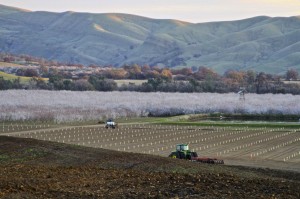
Steele dedicates “a couple hundred” acres to his olive crop, which will enter into full maturity next season. At that point the yield will level off at 30,000 to 35,000 gallons of oil per year. It will have been a steep climb over a few short years to get to that point: two years ago Steele produced just 1,000 gallons of oil; this year he expects the final yield to be about 12,000 gallons.
A large display at Spud’s showcases almost all of Capay Valley Ranches’ product line, a boon for locals since Spud’s is the only vendor of the products in Washington State. Steele says theirs is an intentionally small-scale operation so most of the product is spoken for, even before the processing is complete.
Spud’s carries Arbequina olive oil and the basil, blood orange, and Meyer lemon infusions. They also offer Steele’s elderberry and cranberry balsamic vinegars.
Capay Valley Ranches also produces traditional balsamic and pear-balsamic vinegars as well as oils from two late-harvest olives, Arbosana and the strong, peppery Koroneiki.
Dave Jekel says he finds himself cooking most often with the basil or blood orange oils, or just putting them out as a dip for crusty breads.
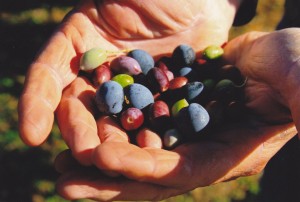
“They’re unique, you know. Unless you’re at a specialty store, it’s hard to find anything like else like it.”
2828 Capitol Boulevard in Olympia
360-915-9763







































